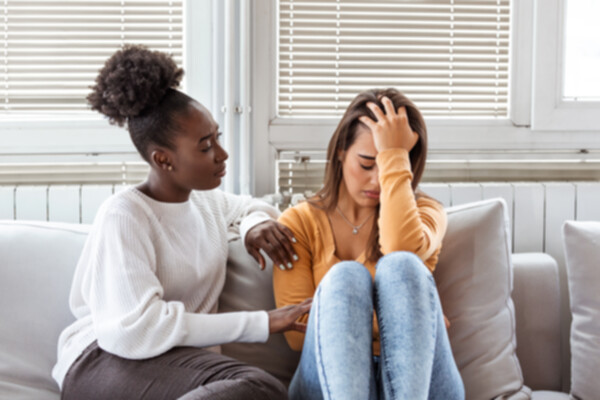If you think you can’t trust anyone, you may be suffering from trust issues. Discover the main signs, why it happens and how to deal with a lack of confidence.

If you ever thought about ‘I don’t trust anyone ‘There’s a good chance you’re experiencing trust issues. Feeling like you can’t trust others can make your relationships with others completely challenging. But why don’t we trust people?
Trust is one of the most fundamental aspects of healthy relationships, whether it’s with family, friends, or romantic partners. However, for some people, trusting others can feel almost impossible. Trust issues can stem from various factors, including past experiences and personal insecurities, and can create barriers in developing close relationships.
If you’re wondering, “Why don’t I trust anyone?” you’re not alone. In this article, we’ll explore five common reasons behind trust issues and how to start rebuilding trust in yourself and others.
What are trust issues?
Trust is a key element in any type of relationship. Even so, trusting people is not always easy, even if you have a very close bond with them.
In this way, people who have trust issues They usually notice it in the closest relationships, such as those with close friends, family members or partners. In these cases, it can cause obstacles in the bond because the lack of trust ends up preceding thoughts, emotions and actions that are harmful to others because they generate negative ideas about loved ones, as well as suspicions and jealousy.
Usually, not trusting anyone or lack of trust It can be linked to the following mental problems or disorders:
- Depression
- Adjustment disorders (difficulty dealing with certain stresses)
- Anxiety
- Fear of abandonment
- Attachment problems
- Posttraumatic stress
- Schizophrenia
The Importance of Trust
Trust is essential for forming and maintaining healthy relationships. Without trust, connections with others can feel shallow, uncertain, and unfulfilling. It is the foundation that allows individuals to feel safe, supported, and understood by others.
However, when trust is broken or never fully developed, it can lead to emotional walls that prevent intimacy and mutual understanding.
5 Reasons Behind Trust Issues
1. Past Betrayals
One of the most common reasons people develop trust issues is due to past betrayals. Whether it’s infidelity in a romantic relationship, a broken promise from a close friend, or deceit by a family member, these experiences can leave deep emotional scars.
When trust is violated, it creates a defense mechanism to avoid future hurt. The fear of being betrayed again can lead to a reluctance to open up or rely on others.
2. Fear of Vulnerability
Trusting someone requires being vulnerable, and for many people, vulnerability feels uncomfortable or even dangerous. Letting someone into your inner world—sharing your thoughts, feelings, and fears—means that you’re exposing yourself to potential judgment or rejection.
For those with trust issues, this fear of vulnerability can make it difficult to form meaningful connections. Instead, they may keep their emotional distance to avoid getting hurt.
3. Low Self-Esteem
People with low self-esteem often struggle with trusting others. If you don’t feel confident or worthy, you might believe that others will eventually see your perceived flaws and abandon you. This can lead to constant worry about whether others truly care or have your best interests at heart.
In such cases, trust issues may arise from the belief that you are undeserving of love, respect, or loyalty, making it hard to accept when others offer these things.
4. Lack of Trust in Yourself
Another major contributor to trust issues is a lack of trust in oneself. If you don’t feel confident in your own decisions, it’s challenging to trust the choices you make about other people. For instance, if you’ve been hurt in the past, you might question your ability to judge someone’s character accurately.
This self-doubt can spill over into your relationships, causing you to second-guess other people’s intentions or actions, even when they’ve done nothing wrong.
5. Unresolved Trauma
Unresolved trauma from childhood or past experiences can deeply affect the ability to trust others. If you’ve experienced abuse, neglect, or any form of emotional or physical harm, it can distort your view of relationships and safety.
Trauma survivors often struggle to believe that others have good intentions or that they won’t be hurt again, leading to a heightened sense of mistrust in both intimate and casual relationships.
Signs that indicate that you don’t usually trust anyone
The people that have trust issues With others, they usually have the following attitudes:
- You don’t believe what they say: The people who usually not trusting others. They tend to verify the words they say. Although there are no reasons to doubt the honesty of the partner, friends or family, the lack of trust is such that they do not usually consider a truth unless they confirm it themselves.
- They always expect the worst: When they exist trust issues, Those who suffer from it usually have the tendency to always think of the worst. In this way, they tend to be suspicious of many of the attitudes, words or behaviors of others.
- You maintain a certain distance from others: To the Do not trust anyone, people may feel anxious when opening up or approaching new people, even though they long to do so. Additionally, people with a lack of confidence often have trouble letting go, as they may feel vulnerable.
- Jealous behaviors: Jealousy is usually associated with lack of trust with others, especially in romantic relationships. In fact, research has shown that trust issues are often determining factors when experiencing jealousy in relationships.
These are some of the signs that could indicate that you tend to don’t trust anyone Given these signs, it is important that you work on restoring trust with others due to all the consequences it can have on both your relationships and your mental health.

Why don’t I trust anyone?
Studies indicate that people who feel that You can not trust anyone They often have these thoughts due to bad social experiences. So much so, that it is the first relationships with family members and schoolmates that provide an opportunity to trust and depend on the people closest to you. When these links have meant something negative, this can contribute to ending up distrusting others. In this way, we can say that the main reasons why we may feel trust problems with others are the following:
- Bad experiences in early childhood: Trust begins to be learned from the first days of life, when babies discover for themselves if they can really trust their parents and others. Therefore, people who grow up with more supportive family and friends tend to have greater trust with people.
- Suffering from bullying or rejection: Throughout our lives, interpersonal and social experiences can affect trust toward others. In fact, suffering from harassment or suffering from social rejection by others can contribute to people ending up having trust problems in their relationships.
- Negative relationships: People who have been in an unhealthy romantic relationship may end up extrapolating these feelings of distrust to the other relationships in their lives.
- Trauma: Having suffered from trauma during childhood or adolescence related to attachments can also end up developing this feeling of ‘Do not trust anyone ‘.
- Mental disorders: Suffering from a mental disorder such as too much stress, anxiety, depression, as well as other personality disorders can also influence these. trust issues
If you think you have this lack of trust in others and this is causing a problem for you in your daily life, we recommend that you consult with a professional psychologist.
Why don’t I trust my partner?
Currently, there are different investigations that indicate that in the last ten years there has been an increase in trust issues in couples. According to some scholars, this lack of trust may stem from recent technological advances that make it easier for people to deceive others. Even so, having a trust problem within a relationship can affect in such a way that it ends up promoting the couple’s separation. Therefore, it is important that we focus on solving this mistrust and talk about it with him or her.

How to deal with trust problems?
Even if you find it difficult to trust people again now, there are some strategies that can help you learn to restore trust in the others:
- Take small steps: To start, it’s important to look for small ways to trust people again. Trust is something that is built day by day, therefore, these gestures can help you have more confidence in others.
- Stay positive: Try to be optimistic about others. Start believing that there really are good people for you. Having a more open mind in different social situations can help you trust others more.
- Learn to set limits: Sometimes the trust issues. They may be related to the fact that you have not learned to set limits for others. Therefore, saying what you don’t want should be your priority to reestablish trust with others.
- Go to therapy: Don’t trust anyone It can affect your daily routine due to anxiety. When this happens, it is important to consult with a professional to be able to solve the negative thoughts that are holding you back.
The Impact of Trust Issues
Strained Relationships
When trust issues are left unaddressed, they can place a significant strain on relationships. Lack of trust leads to emotional distance, constant suspicion, and a reluctance to fully engage with others. This can result in misunderstandings, arguments, and the eventual breakdown of connections.
Loneliness
Trust issues often lead to loneliness. When you struggle to trust others, it can feel safer to isolate yourself, avoiding the risk of getting hurt. However, this creates a cycle where isolation leads to deeper feelings of loneliness and a stronger belief that people can’t be trusted.
Anxiety and Stress
The constant worry about whether someone is being honest or loyal can lead to ongoing anxiety and stress. Trust issues can create mental exhaustion as you try to anticipate others’ actions or question their intentions.
How to Overcome Trust Issues
Acknowledge the Root Cause
The first step in overcoming trust issues is to acknowledge the root cause. Reflect on past experiences that may have triggered your distrust in others. Were there specific betrayals or traumatic events that made it difficult to trust? Understanding the origin of your trust issues can provide valuable insight into how to heal.
Work on Self-Esteem
Building self-esteem is crucial in overcoming trust issues. When you feel confident in yourself, you’re more likely to trust others because you know that you can handle potential disappointments or setbacks. Self-esteem helps you set healthy boundaries, allowing you to trust others while protecting yourself.
Practice Vulnerability in Safe Spaces
Start by practicing vulnerability in relationships where you feel safe. This could be with a trusted friend, therapist, or family member. By gradually opening up to others, you’ll begin to see that vulnerability doesn’t always lead to betrayal, and it’s possible to trust again.
Set Healthy Boundaries
Setting healthy boundaries is essential for rebuilding trust. Boundaries help create a sense of safety and control in relationships. They allow you to engage with others while still protecting your emotional well-being.
Seek Professional Help
If your trust issues are deeply rooted in trauma or unresolved emotional pain, seeking the guidance of a therapist or counselor can be incredibly beneficial. Professional support can help you work through the underlying issues and develop healthier ways of relating to others.
Trust issues are common, and they often stem from past betrayals, trauma, or low self-esteem. While trust issues can be challenging, it’s possible to rebuild trust in yourself and others by acknowledging the root causes, practicing vulnerability, and setting healthy boundaries.
By taking small steps toward healing, you can begin to open yourself up to meaningful and fulfilling relationships once again.
FAQs
Why do past betrayals affect my ability to trust?
Past betrayals create emotional scars, making you more cautious and defensive in future relationships to avoid being hurt again.
How does low self-esteem contribute to trust issues?
Low self-esteem leads to self-doubt, making it harder to believe that others have good intentions or that you are worthy of trust.
Can therapy help with trust issues?
Yes, therapy can help address the root causes of trust issues, such as unresolved trauma, and provide tools for building healthier relationships.
What are some signs that I have trust issues?
Signs include difficulty opening up, suspicion of others’ intentions, emotional distance, and fear of vulnerability in relationships.
How can I practice vulnerability in a safe way?
Start by sharing small aspects of yourself with people you trust, gradually building your comfort with vulnerability over time.








